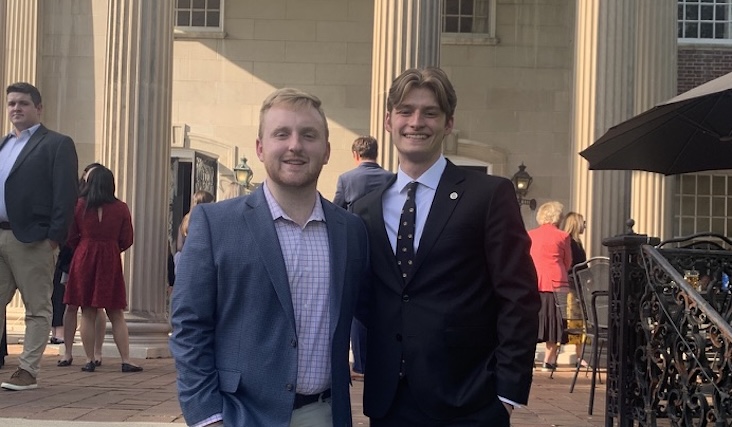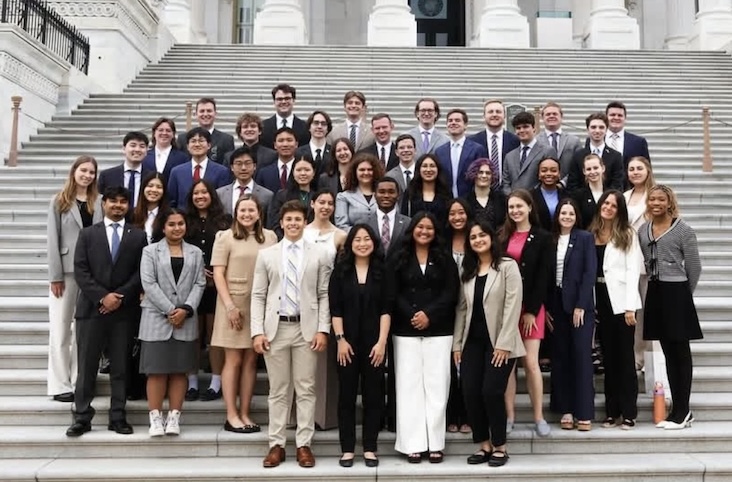“On Compromise,” A Report back from the Henry Clay College Student Congress with Parker Ezell and Christian Kasten

Senior Constitutional Democracy majors Parker Ezell and Christian Kasten started summer 2025 back in the classroom at the Henry Clay College Student Congress, a two-week immersive program that brings together 51 rising college seniors representing each state and the District of Columbia to develop bipartisan policy solutions to real issues facing the US. The program starts in Lexington at the University of Kentucky’s Henry Clay Center, where participants break into teams that are assigned specific policy issues to tackle. From there, students board a bus for a week in Washington, DC, where they put their policy proposals into action and experience life inside the Beltway.
Talking about their week at UK, Christian, who was representing his home state of Arkansas, and Parker, there to represent Missouri, both noted that working so closely with policy, and doing so with such a diverse group of colleagues, provided an important opportunity for self-reflection. “I really had to wrestle with base assumptions I made about policy topics and articulate why my values were prioritized in certain ways,” Christian said. “Every time I thought I figured out my position, someone would show me a new perspective.” There was some learning on the job for Parker, as well. “I was assigned to a policy group with which I had no prior experience. It made me humble myself, ask a lot of questions, and dive into research to contribute.”
As for their time at the negotiating table, both Kinder delegates walked away from the experience with re-affirmed faith that compromise is alive and well, and when approached with civility and generosity of spirit, can help bring about impactful change.
Christian, who was part of a team creating solutions to US trade and tariff policies, described how the shared commitment to the public good that animated his group streamlined the bipartisan policymaking process. “We started by making partisan policy plans. The morning after, we sat down with the other side of the aisle with instructions to ‘make a policy proposal both teams agree on.’ We were all coming from the same place of ‘Let’s make our community better,’ and I wasn’t ready for how much goodwill and collaboration can actually solve problems.”
Parker, who “found his strengths during the compromising process,” was similarly impressed with the way participants from different backgrounds could collectively arrive at solutions to issues that at times divide us. “We had excellent discussions that opened my eyes in certain areas and helped me understand different perspectives. Knowing that our generation is capable of such a level of civility, especially in these challenging times, has made me incredibly hopeful about our future.”

Once they landed in the nation’s capital, each group presented their proposed solutions to the Bipartisan Policy Center, but this was only one part of a busy week. Among other things, participants got a private tour of the US Supreme Court and had private sessions with DC lawyers, politicians, and journalists, including CNN’s Wolf Blitzer.
For Parker, who spent last summer interning in the House of Representatives through the Kinder Scholars Program, being back in DC was like bringing friends home. “Several of my fellow cohort members had never been to Washington. While we were at the Capitol, I was able to take them on a tour through my former office. Seeing their faces when they got to walk on the House floor for the first time was something I will never forget, and it was all thanks to Kinder!”
Christian added that the small, seminar-style classroom environment at the Kinder Institute was an aspect of life on the fourth floor of Jesse Hall that prepared him for the experience. “Kinder’s Socratic-based approach has taught me to be much more of an active listener as well as how to interact when I disagree with someone’s perspective,” he said. “People are more willing to hear you out when they know you’re doing the same. That’s something you just don’t learn from lectures.”
And for any other student who, as Parker put it, wants “to make new friends from all over, strengthen your knowledge of the policy process and policies themselves, and learn how to negotiate and compromise with people who hold different viewpoints from yours,” applications for the Henry Clay College Student Congress open just after the beginning of winter break. “I would suggest showing that you are passionate about your state, its issues, and helping people,” Christian advised future applicants. “The reviewers want to know you’re someone who wants to make a difference.”
